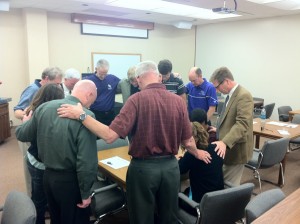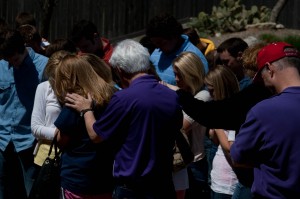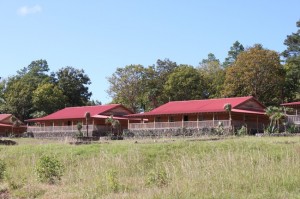by Amanda Pittman | Sep 9, 2011 | Careers In..., College Decisions, Current Students
Aaron is a sophomore marketing major from Burleson. He came to ACU interested in pursing a career in sports management or sports marketing. After attending a job fair in Dallas centered around the corporate side of sports, Aaron made connections with the front office of FC Dallas. He accepted the unpaid internship because he was excited about the opportunity and experience and knew it would be a great resume builder. We’ve asked Aaron to share about his summer internship experience with us:
Every experience gained throughout this internship was a vital building block in my understanding of life, business, and personal goals. This thirteen-week experience of trials, setbacks, and successes was a much-needed real world encounter. I came into this internship with expectations of what a professional soccer team would be like, and I was very please with what I found.

Aaron at Cowboy Stadium for an FC Dallas game
The business side is completely different from the game played on the field. These two sides have to work together in order to compete well against other teams and stay profitable and sustainable. FC Dallas has the one of the most consistent organizations in the MLS with numbers to back it up. They’re growing in popularity every year, and are consistently staying competitive. These are great signs for what the future holds for the game here in the United States of America.



When I first interviewed for the Team Administrative & Player Personnel Intern position, I wanted to make it clear that I wanted to learn the business of sports. Wherever they were going to put me, I was going to soak up as much information as possible through this experience. Come to find out when I started I was given just what I was asking for. My position gave me the ability to work and help with the team at practices and games.

FC Dallas at Cowboys Stadium
I also worked in the corporate office dealing with scouting databases, budgets, and logistics for the Team Administration and players to which it gave me the other perspective. Both sides of the puzzle were at my grasp to learn from multiple supervisors that were either directors, managers, or coaches. All of which have amazing stories that helped with me understanding more insights in today’s complex sports niche. I am extremely thankful for the trust that they gave in me with passing sensitive information in order for me to learn.

Time was my only downfall to this experience with which I wanted more time to be a part of this great organization. These thirteen weeks flew by with so many different scenarios that I was able to learn from for future successes. The projects given to me to be responsible for at FC Dallas were great challenges for me to start, but now the projects must be passed to the next intern for furthering them in benefiting the company. There is still much to learn about this sport and how things are done, but I have a feeling it wont be my last time in this related field. I thank God for my opportunity with FC Dallas, and I hope that I made a lasting impression.
by Amanda Pittman | Sep 8, 2011 | COBA Events, College Decisions, Current Students, Faith Infusion
From Dr. Don Pope, chair, Department of Management Sciences:
A Christian Business School
Students and parents choose a university based on several possible criteria. For those students majoring in business at ACU, some possible reasons would include our faculty – undergraduate courses taught, not by graduate assistants, but by faculty who are qualified both academically and by business experience. Our accreditation with AACSB places us in the select category of the best business schools in the world. Our size – ACU is large enough to offer a broad range of quality programs in excellent facilities, but small enough that our students are not lost in the crowds of larger schools. And for students selecting ACU, an extremely significant difference at our College of Business Administration is the integration of Christian faith and learning.
To some people, the words “Christian” and “business” sit uncomfortably in the same sentence. The word business is sometimes taken to mean self-serving and self-seeking at the expense of others – just the opposite of the others-first philosophy taught by Christ. And then you throw in the word “school”, then what does that all mean?
To the faculty and staff at the College of Business Administration at ACU, a Christian business school means the integration of faith and learning in ways that are lived out and not just talked about. In the classroom, it might involve a discussion of ethics or prayerful concern for a student. Beyond the classroom, it involves living out our faith in the market place, whether in towering office buildings in cities or with people living in poverty, anywhere in the world. Our faculty and students build homes and help feed the hungry in garbage dumps in Honduras, provide medical care for people in the remote areas of Zambia, establish and support orphanages in India and Ghana, volunteer for Meals on Wheels, assist the elderly with tax preparation, and countless other acts of service.
Our mission is great – to educate students for Christian service and leadership throughout the world. Our faculty and staff are capable to that challenge. Our students dream big dreams. Come join us in this journey together.

Faculty members praying over the newest inductees of Beta Gamma Sigma

Faculty praying over graduating seniors at our annual Senior Blessing lunch
by Amanda Pittman | Sep 4, 2011 | City of Abilene, COBA Events, College Decisions, Current Students
ACU’s chapter of Students In Free Enterprise (SIFE – a national organization formed by Sam Walton) does several projects with and for the community, using their business skills and knowledge to serve others. One project they do each year is with the elementary students over at Abilene Christian Schools. They set up a ‘little town’ in their school gym, with a bank, retail stores, a grocery store among others. Each student has a chance to earn a specific amount of money, and then they can turn around and either spend the money or save it at the bank – all under the guidance and teaching of our SIFE students and two business professors, Dr. Jinkerson and Dr. Vardiman.
The Abilene Reporter News recently did a story on teaching kids the value of money, and featured our SIFE team and professors. Click here for the full story. We’re proud of Dr. Jinkerson and Dr. Vardiman and the good work they are doing with our students!
by Amanda Pittman | Aug 30, 2011 | College Decisions, Current Students, Mobile Learning
Recently, Dr. Ian Shepherd, Associate Professor in Management Sciences, was honored with a Blackboard Catalyst Award. You can read more about it here. We are thrilled for Dr. Shepherd and grateful for his dedication to innovative teaching in the classroom. We thought you might like to hear a bit more from a few of the students who were in his class and hear about their experience using the ipad in class.
Here were the questions we asked Molly, Leanne and Kayli (who all happened to earn an “A” in the class):
1) How did you use the ipad? Was it in place of a textbook? Did you use it everyday?
“Yes, I used my iPad mostly for the access to the textbook. I used it every class and whenever I was doing homework for the class. So, I was using it 4-5 days a week. It was vital to bring your iPad to class because Dr. Shepherd incorporated it into every class.”
“Outside of class, I mostly used it for Facebook and for looking up information quickly like weather and news. Our textbooks were on the ipad instead of textbook. The nice thing about that was that we could search for terms or phrases in the textbook. I used the ipad most days; it was easy to carry and was a lot faster to get started than a laptop.”
“We used the ipads to download our textbooks. We used an application called Inkling that allowed us to download our textbook and access it just like any other application on an ipad. I also used the ipad for checking class assignments on blackboard, working on group assignments during class (such as graphs, reviews, etc.), and following notes in class. I used the ipad ever class day, and other days that I needed it to work on an assignment (a few times a week).”
2) Did you each have your own?
“Yes, we all got our own iPad which we downloaded the textbook on. We downloaded excel and used it daily as well.”
3) Do you feel using the ipad enhanced what you learned inside the classroom?
“I definitely think that the ipad was a beneficial tool for the class… the ipad helped because it allowed us to be more interactive.”
“Using the iPad in class kept us engaged in class..!”
“I do feel like the ipad enhanced the learning process for me because it allowed the class to be more interactive. We were each capable of entering our own information in to graphs and spreadsheets during class instead of just watching Dr. Shepherd compute the information himself. We were also able to follow along with his lectures by using notes.”
4) What did you like best about using the ipad?
“The best thing about using the ipad was that it was easy and fast to use.”
“I absolutely loved having the textbook online. It was so nice not to have to carry a huge book all around with you.”
“I liked that I could follow along with the notes and keep track of my own notes without having multiple pieces of paper and spirals to keep up with when it was time to study. I also enjoyed the ability to quickly find information in the textbook using the search feature.”
5) What didn’t you like about the ipad?
“I thought it was harder to type on the ipad.”
“I can type pretty quickly on a keyboard, but I was really slow on the ipad. Also, I did not like the version Apple’s version of
Excel that we had to use.”
“I didn’t like using excel on the iPad. It’s not the same as on the computer and took longer to perform the same tasks.
I did not like that it was harder to take notes and online tests on the ipad than on a normal laptop simply due to its physical structure.”
6) If you don’t currently own an ipad, would you purchase one to use in your future classes?
“If more of our textbooks were on the ipad, I would for sure!!”
“I would buy an iPad if all my classes had online textbooks. You can do your homework anywhere at anytime when you have your textbooks right there at your fingertips.”
“I would not purchase one right now because I already own an iphone and a laptop that can perform many of the ipad’s functions, and I do not want to spend the extra money. If it was more affordable and offered more features that I could not already access with other devices, then I would absolutely purchase one.”
by Amanda Pittman | Aug 24, 2011 | College Decisions, Current Students, Dean Chronicles
May you be challenged to stand out from the crowd as we begin a new school year. A message from Dr. Rick Lytle:
After working with undergraduate business students at two universities for nearly twenty years, I’m very proud of the many who stand out from the crowd.
But I can also tell you that many students desire to be average or common. Most freshmen cower regarding greatness. They begin their collegiate experience attending to generic life. Their visions are shallow, myopic, and focused mainly on personal survival. Their benchmarks are set predominantly by their peers and society at large.
Few students have visions of excellence or distinction when they enter college. That is why I have dedicated my life to “higher education” – which is another way to say, “education from above” that is powered by God’s perspective. I seek to create visions of excellence and produce a brand of education that is eternal. I hope and pray someday all my students see their true potential.
Each year, my first attack against the notion of generic comes at the beginning of the semester. I have my students stand in our first class together and read aloud Charles Osgood’s poem entitled “Pretty Good.” I read the poem aloud. Students repeat the refrain, “pretty good.” Imagine the classroom scene the first day of class as a freshman.
There was once a pretty good student who sat in a pretty good class.
And he had a pretty good teacher who always let pretty good pass.
He wasn’t terrific at reading. He wasn’t a whiz-bang at math.
But for him, education was leading straight down a pretty good path.
He didn’t find school too exciting, though he wanted to do pretty well.
He did have some trouble with writing because nobody had taught him to spell.
When doing arithmetic problems, pretty good was regarded as fine.
Five plus five needn’t always add up to ten. A pretty good answer was nine.
The pretty good class that he sat in was there in a pretty good school.
And this student was not an exception. On the contrary, he was the rule.
The pretty good school that he went to was there in a pretty good town.
And nobody seemed to notice, he couldn’t tell a verb from a noun.
This pretty good student in fact, was part of a pretty good mob.
And the first time he knew what he lacked, was when he
looked for a pretty good job. It was then, when he sought
a position, he discovered that life could be tough.
And he soon had a sneaking suspicion, pretty good
might not be good enough. The pretty good town in our story
was there in a pretty good state, which had pretty good aspirations,
and prayed for a pretty good fate. There once was a pretty good nation,
proud of the greatness it had, which learned much too late,
if you want to be great, pretty good, is in fact, pretty bad.
All too often, the pretty good student wants opportunities to participate in the best classes, premium internships and high-paying jobs. Unfortunately, on earth and in heaven, pretty good earns few opportunities and rewards. time and again the “good enough” worker wonders why she was released from her job. Too often the “average” business finds itself in decline and financial turmoil. Ordinary church leaders discover, to their surprise, that the body is dying. Run-of-the-mill husbands and wives find their partners solemn and their marriages falling apart. Mediocre parents struggle over the moral and spiritual drift of their children. Please know that lives of distinction never result from ordinary living. Good enough never is!
Once while teaching in the marketplace, Jesus told a great story about true value. An employer gave three workers money according to their abilities. Two workers doubled their money. A third worker buried his money. When the employer asked how they were doing, he was happy that two of his workers doubled his investments. He was furious at the one who had buried the money and returned the same amount. The employer said the third worker could have at least put the money in the bank to draw interest. Then he fired the third worker, calling him a wicked, lazy servant.
Burying your talent is easy. You need no desire to be great, no set of deliberate practices, and you certainly have no need for a distinctive and compelling set of promises and actions. You won’t stand for anything, and no one will follow.
On the other hand, if you want to do something extraordinary with what you have been given by God, you are moving toward the starting line in the race to build a brand that matters. You can take your talents and multiply them and not only bring your employer but your Creator a great return on the investment in your life.
Excerpted from Abandon The Ordinary, by Dr. Rick Lytle
by Amanda Pittman | Aug 18, 2011 | College Decisions, Current Students, Executives In Residence, Uncategorized
Earlier this summer, three b-school professors, Dr. Jim Litton, Dr. Darryl Jinkerson and Dr. Andy Little headed to Mission Lazarus, in the Choluteca area of Honduras. ACU and the College of Business, in particular, have a unique relationship with Mission Lazarus. COBA grad Jarrod Brown co-founded the mission after a high-paying job was leaving him unsatisfied. Brown says, “The defining moment was seeing a need in the mission field where my business training from ACU could be a valuable asset for the Lord’s kingdom, rather than just for my pocketbook.”
Mission Lazarus focuses on four specific areas: agricultural teaching, medical clinics, educational programs and schools and spiritual formation ministries. To read more about Mission Lazarus, visit their website here.

We recently caught up with Dr. Little to find out more about their visit to Mission Lazarus:
- What was the purpose of the trip? What did you all do while there?
The Griggs Center sponsored our trip to Honduras to scout potential locations and partners for future global business programs for COBA students. Jim Litton, Director of the Griggs Center, invited Darryl Jinkerson and me to join him in visiting with Jarrod Brown and the Mission Lazarus staff on-site in the Choluteca area of Honduras. We spent time touring the Mission Lazarus facility, meeting with Jarrod to discuss possible opportunities, and getting to know the Honduran people and culture. We paid particular attention to ways in which COBA students interested in social entrepreneurship might be able to work with Mission Lazarus in some kind of short-term internship opportunity. Future plans are still in the embryonic phase, but this trip gave us tangible data by which to assess the possibilities and inspired us to work to provide students with opportunities in Central America.

View from the Mission
- Why do you think it’s important that are students have the opportunity to visit and work with Mission Lazarus?
Mission Lazarus is an amazing place, led by a dynamic team. Jarrod is a visionary leader of the highest caliber, and he has surrounded himself with talented people and supporters who help him implement his dream of transforming an impoverished nation for Christ. He has taken several otherwise traditional organizational models–evangelistic missions, for-profit business, rural health care, and education–and combined them in a way that is unique and all-encompassing. I think COBA wants its students to have access to and be inspired by this kind of leadership. More than this, Mission Lazarus fits perfectly with the social entrepreneurship emphasis in the Griggs Center.

- What do you hope our students learn from the class?
Our goal is to put together a multi-week program that combines stateside coursework with an internship at Mission Lazarus focusing on social entrepreneurship in the developing world. If we are successful in making this offering happen, we think it can be a flagship program for the Griggs Center and give students real-world experience with social entrepreneurship. Ultimately, I think much of what students could learn will be internal: the experience we hope to create will help them find out who they are and what really matters to them.

the Refuge at Mission Lazarus
***
If you are interested in learning more about this opportunity or the Griggs Center for Entrepreneurship & Philanthropy, feel free to send an email to coba@acu.edu.











